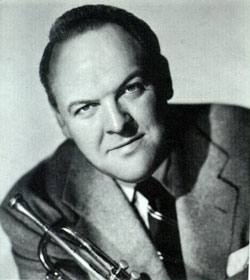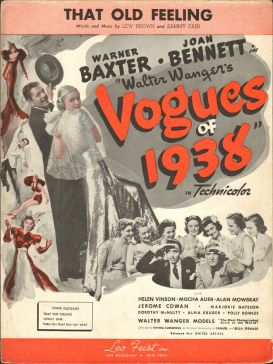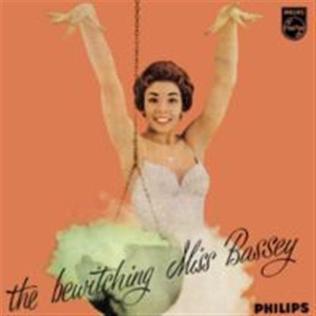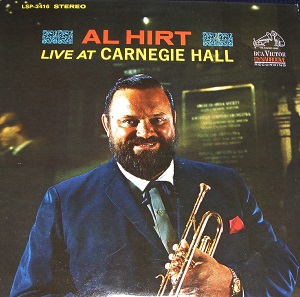
Edward William May Jr. was an American composer, arranger and trumpeter. He composed film and television music for The Green Hornet (1966), The Mod Squad (1968), Batman, and Naked City (1960). He collaborated on films such as Pennies from Heaven (1981), and orchestrated Cocoon, and Cocoon: The Return, among others.

"That Old Feeling" is a popular song about nostalgia written by Sammy Fain, with lyrics by Lew Brown. It was published in 1937.
"Do Nothing till You Hear from Me" is a song with music by Duke Ellington and lyrics by Bob Russell. It originated as a 1940 instrumental that was designed to highlight the playing of Ellington's lead trumpeter, Cootie Williams. Russell's words were added later. In 1944, Ellington's own recording of the song was a number one hit R&B chart for eight non-consecutive weeks and number six on the pop chart.
"Sometimes I'm Happy" is a popular song. The music was written by Vincent Youmans, the lyrics by Irving Caesar. The song was originally published in 1923 under the title "Come On And Pet Me," with lyrics by Oscar Hammerstein II and William Cary Duncan.
"I'll Get By (As Long as I Have You)" is a popular song with music by Fred E. Ahlert and lyrics by Roy Turk. The song was published in 1928. Versions by Nick Lucas, Aileen Stanley and, most successfully, Ruth Etting, all charted in America in 1929.

Day by Day is a Doris Day album released by Columbia Records on December 17, 1956. The title is an obvious pun, both meaning "on a daily basis" and "(Doris) Day, in the daytime". The album was issued as Columbia catalog CL-942.
"Just One of Those Things" is a popular song written by Cole Porter for the 1935 musical Jubilee.
"September in the Rain" is a popular song about nostalgia by Harry Warren and Al Dubin, published in 1937. The song was introduced by James Melton in the film Melody for Two. It has become a standard, having been recorded by many artists since.

"Basin Street Blues" is a song often performed by Dixieland jazz bands, written by Spencer Williams in 1928 and recorded that year by Louis Armstrong. The verse with the lyric "Won't you come along with me / To the Mississippi..." was later added by Glenn Miller and Jack Teagarden.
"I've Got Five Dollars" is a 1931 popular song composed by Richard Rodgers, with lyrics by Lorenz Hart for the musical America's Sweetheart (1931) where it was introduced by Harriette Lake and Jack Whiting.
"Johnny One Note" is a 1937 show tune from the 1937 Rodgers and Hart musical Babes in Arms, where it was introduced by Wynn Murray. Judy Garland sang it in the Rodgers & Hart biopic Words and Music (1948).
"(You'd Be So) Easy to Love" is a popular song written by Cole Porter for William Gaxton to sing in the 1934 Broadway show Anything Goes. However Gaxton was unhappy about its wide vocal range and it was cut from the musical. Porter re-wrote it for the 1936 film Born to Dance, where it was introduced by Eleanor Powell, James Stewart, and Frances Langford under its alternate title, "Easy to Love". The song was later added to the 1987 and 2011 revivals of Anything Goes under the complete title "You’d Be So Easy to Love".

The Bewitching Miss Bassey is the second studio album by Welsh singer Shirley Bassey. Consisting of new and previously released material, this was the first album by Bassey to be issued on the 12" Long-playing record format. Tracks were taken from sessions recorded between 1956 and early 1959. All the songs were recorded in the UK with Wally Stott and his Orchestra, with production by Johnny Franz. The only exception was "The Wall" which was recorded in New York with Jimmy Carroll and his orchestra and produced by Mitch Miller. Featuring Bassey's first five hit songs, including Bassey's 1958 number one single "As I Love You" and the huge hit "Kiss Me, Honey Honey, Kiss Me". The album showcases the best of the early career of Shirley Bassey. All the songs were only recorded in mono, no stereo versions are known to exist. In the 1970s Philips did re-issue them in an "electronically enhanced" stereo. The album was re-issued in the US on the Epic label with different artwork. While this album has not been issued independently on CD, it was included in its entirety on the four-CD compilation titled Five Classic Albums Plus Bonus Singles in 2012.
Alan "Buz" Kohan is an American television writer, producer and composer.
"We'll Be Together Again" is a 1945 popular song composed by Carl T. Fischer, with lyrics by Frankie Laine.
"Can't We Be Friends?" is a 1929 song with lyrics by Paul James and music by Kay Swift, introduced on Broadway in The Little Show by Libby Holman. It was later recorded by many artists including Bing Crosby, Ella Fitzgerald, and Frank Sinatra.
The Dream's on Jeri – a Jasmine Records collection of Jeri Southern performances culled from various sources – radio, television and live appearances. The album was released in 1998.
"The Second Time Around" is a song with words by Sammy Cahn and music by Jimmy Van Heusen. It was introduced in the 1960 film High Time, sung by Bing Crosby with Henry Mancini conducting his orchestra, and was nominated for the Academy Award for Best Original Song. It lost out to "Never on Sunday".

Live at Carnegie Hall is a 1965 live album by Al Hirt released by RCA Victor recorded at Carnegie Hall. The album was produced by Jim Foglesong arranged by Gerald Wilson.

Shirley MacLaine Live at the Palace is a 1976 live album by the actress and singer Shirley MacLaine recorded live at New York City's Palace Theatre. The show replicated the success MacLaine had with a similar series of concerts earlier in the year at the London Palladium.






